Do you like pie graphs? I hope so. This post is going to have pie graphs.
I started making formal political endorsements on this website in 2004, a little more than four years after I turned eighteen and gained the right to vote. Since then I have evaluated in-writing every candidate and every issue that has appeared on my ballot. That’s 227 candidates for 95 offices and 61 yes/no ballot issues. So there’s plenty of stuff that you can go back and read and get me “canceled” for.
Every so often, I look back at my statistics to see if I can discern any trends or interesting tidbits. That’s what this post is about. So if you have no interest in a bunch of statistical data about my personal politics, you should probably just click away now. I’ll have something else for you to read soon.
I am an independent. I have never joined a political party, and I don’t plan to. The current version of my “about” page says, “I’m mostly ‘small-l’ libertarian on economic issues and somewhere center-right on social issues. I call myself an ‘independent constitutional conservative,’ although you might label me as part of the ‘conservatarian’ movement.”
I tend toward Republicans much more than Democrats, but I am also open to for voting for Libertarians and other third-party or independent candidates depending on the situation.
I always try to make a serious, dispassionate evaluation of every candidate and issue before me, and I endorse and cast my ballot for the ones that I believe are the best available options given the circumstances. Even when I have voted a straight party-line ticket, I have done so only because of my evaluation of each individual candidate in each individual race. Party affiliation can be one of the considerations (especially when I’m trying to fill in the gaps that a reticent candidate leaves), but it is never the determinant.
Candidate Endorsements
I usually endorse and vote for Republicans . . . much as it pains me to say so. As I mentioned earlier, between 2004 and 2021, I evaluated 227 candidates for 95 offices. That’s an average of 2.39 candidates per race and 5.59 races per year.
Politically, I voted for Democratic Party candidates 6% of the time, Republican Party candidates 62% of the time, independent or third-party candidates 5% of the time, and in the remaining 27% of races I made no endorsement. If you exclude those races in which I made no endorsement, that shifts the numbers a bit: 8% for the Democrats, 85% for the Republicans, and 7% for independent and third-party candidates.
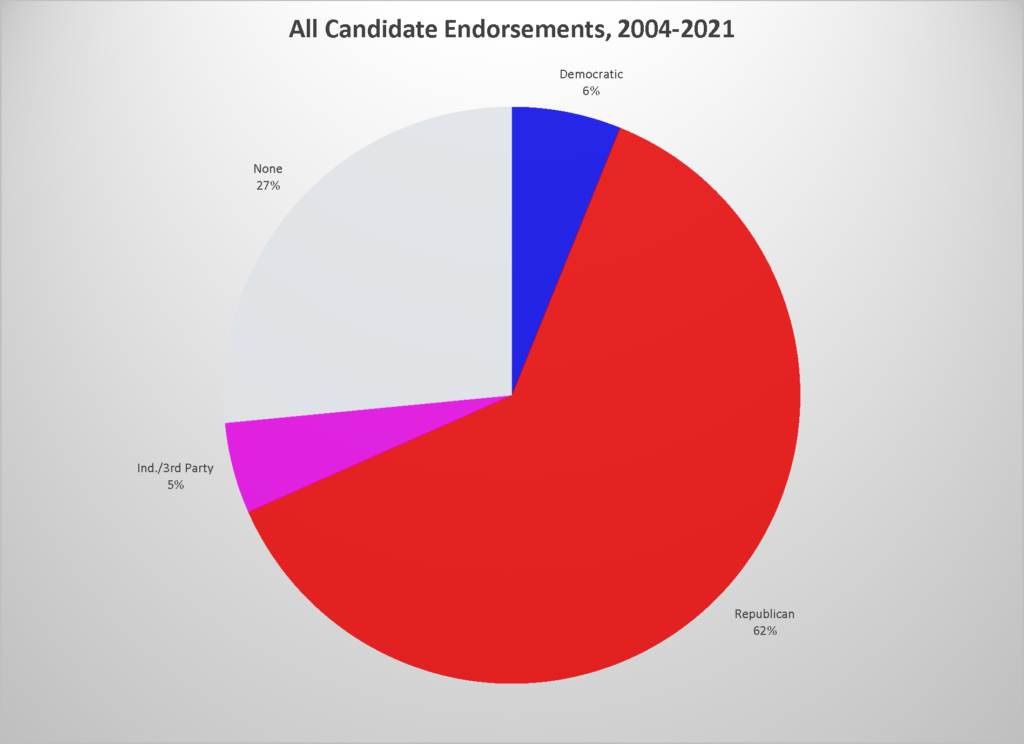
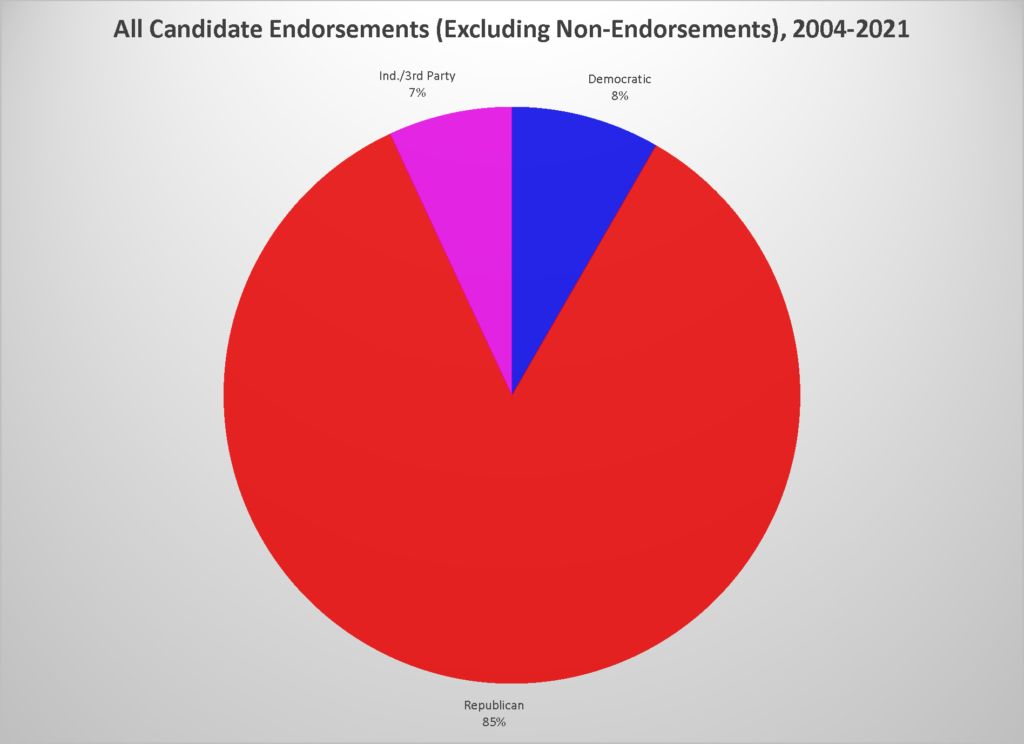
Things do, however, tend to look a bit different at different levels of governement.
Federal Candidate Endorsements
At the federal level—my votes for President of the United States, U.S. Senate, and U.S. House of Representatives—my Republican leanings are a bit more pronounced than they are overall.
I tend to have a fairly narrow focus in my federal votes. I’m looking for candidates who support human rights (especially the right to life, free speech and press, religious liberty, and the right to keep and bear arms), and those who support the principles of federalism and limited government. Any candidate who thinks that most problems should be solved at the federal level is automatically suspect, and that really hurts Democratic candidates in my evaluations.
Limiting the statistics to federal offices, I have voted for Democratic candidates only 5% of the time, Republicans 80% of the time, and independent or third-party candidates 15% of the time. I have not made any “non-endorsements” at the federal level.
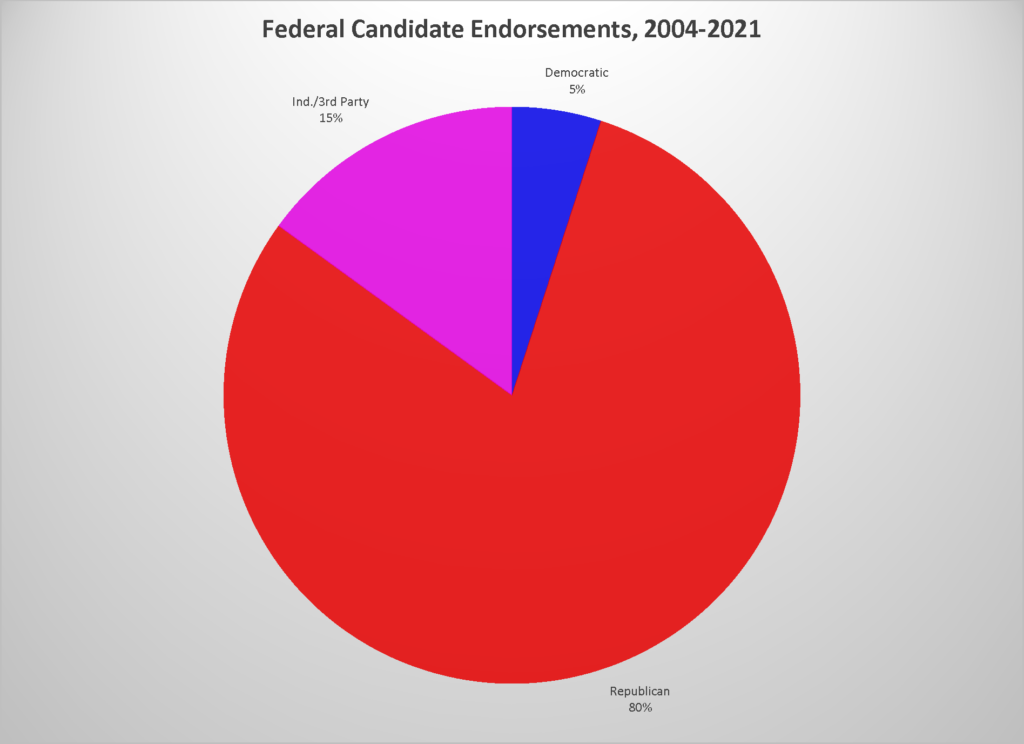
State Candidate Endorsements
Over the entire time I have been making endorsements, I have resided in the Commonwealth of Virginia.
In races for Governor, Lieutenant Governor, Attorney General, and members of the Virginia General Assembly, I still focus on the human rights and federalism issues that I mentioned above in my discussion of my federal votes. But I also increase my attention to some particular state-level issues: transportation, education, and matters relating to the economy and taxes. Before I looked at the numbers, I would have guessed that the Democratic Party would have done better here than they did at the federal level, but it didn’t work out that way.
The old kind of Virginia Democrat—the kind that supported free speech and the right to keep and bear arms, and was less antagonistic to the right to life than the national party—could still earn my vote. But they have pretty much been drummed out of their party. And even if that weren’t the case, Democratic Party approaches to education and the economy are . . . well . . . bad.
Limiting the statistics to state offices, I have voted for Democrats 4% of the time, Republicans 89% of the time, and I have made no endorsement in 7% of races. If we exclude those non-endorsement races, it works out to 4% for the Democrats and 96% for the Republicans.
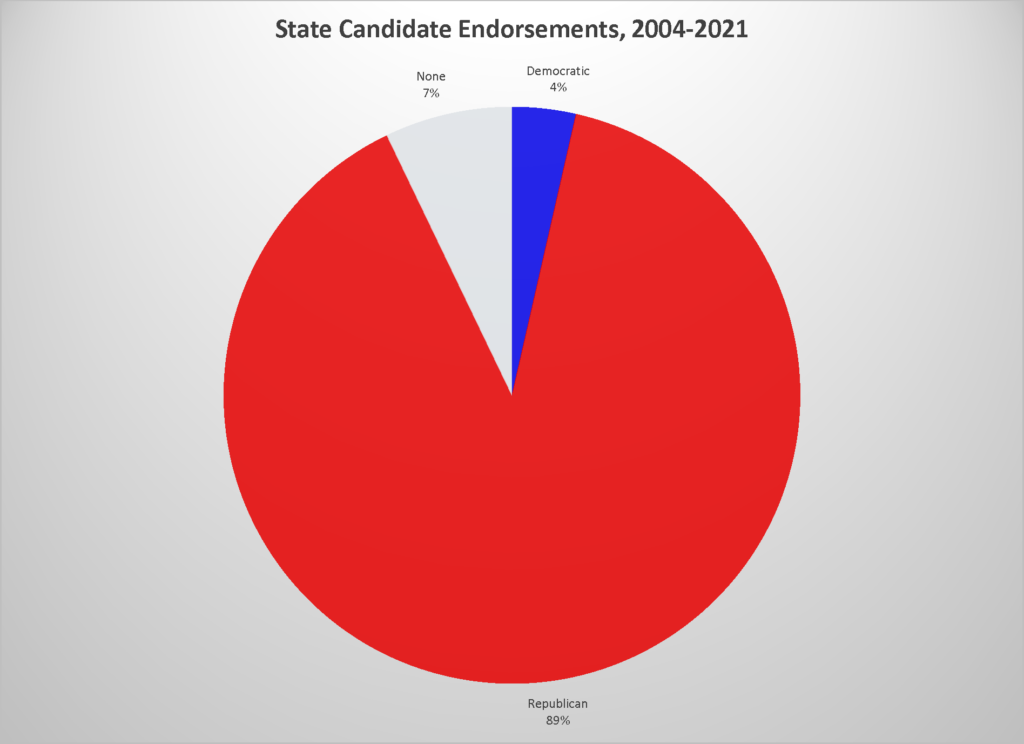
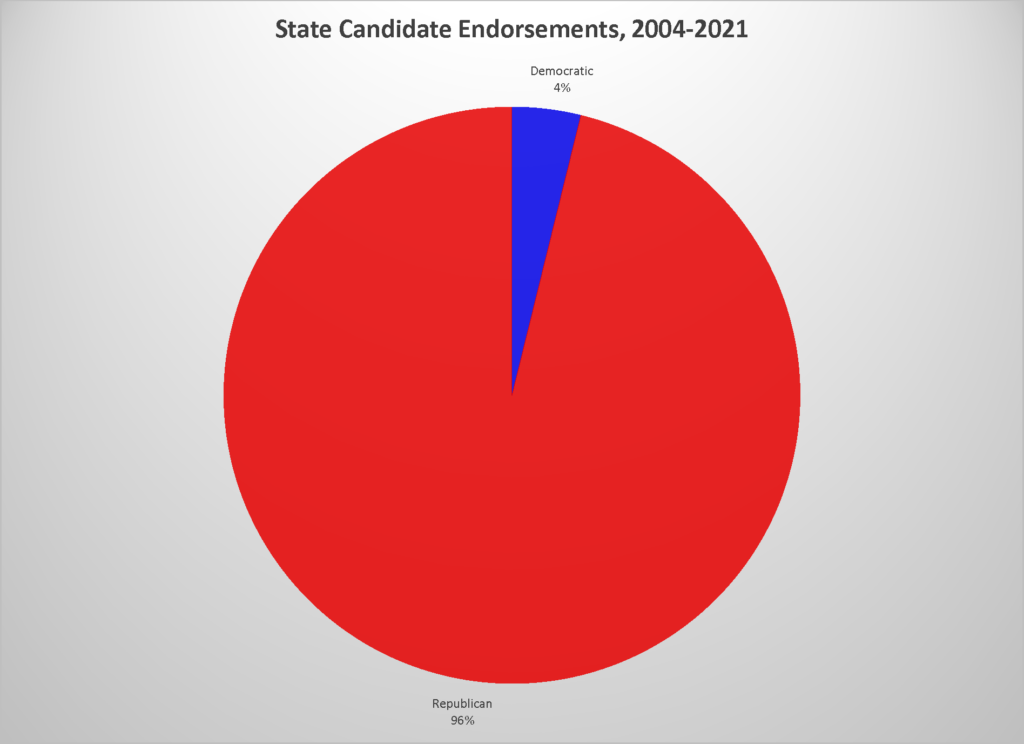
Local Endorsements
Over the time I have been making endorsements, I lived in Fairfax County, Virginia (2004-2009) and Loudoun County, Virginia (2010-present).
In local races, I am less concerned about the big human rights issues . . . not because they are less important, but because officials at this level of government have a lot less control and influence in those areas. My overriding concerns in local races are, well, local: transportation planning, taxes, education, and general competence. Accordingly, my statistics in local races are a bit more “bipartisan.”
At this level I have voted for Democrats 8% of the time, Republicans 40% of the time, third-party and independent candidates 4% of the time, and I have made no endorsement in the remaining 48% of races. The no-endorsement races are mostly local school board races and pointless “soil and water conservation district” races. If you exclude those, it works out as 15% for the Democrats, 77% for the Republicans, and 8% for independent and third-party candidates.
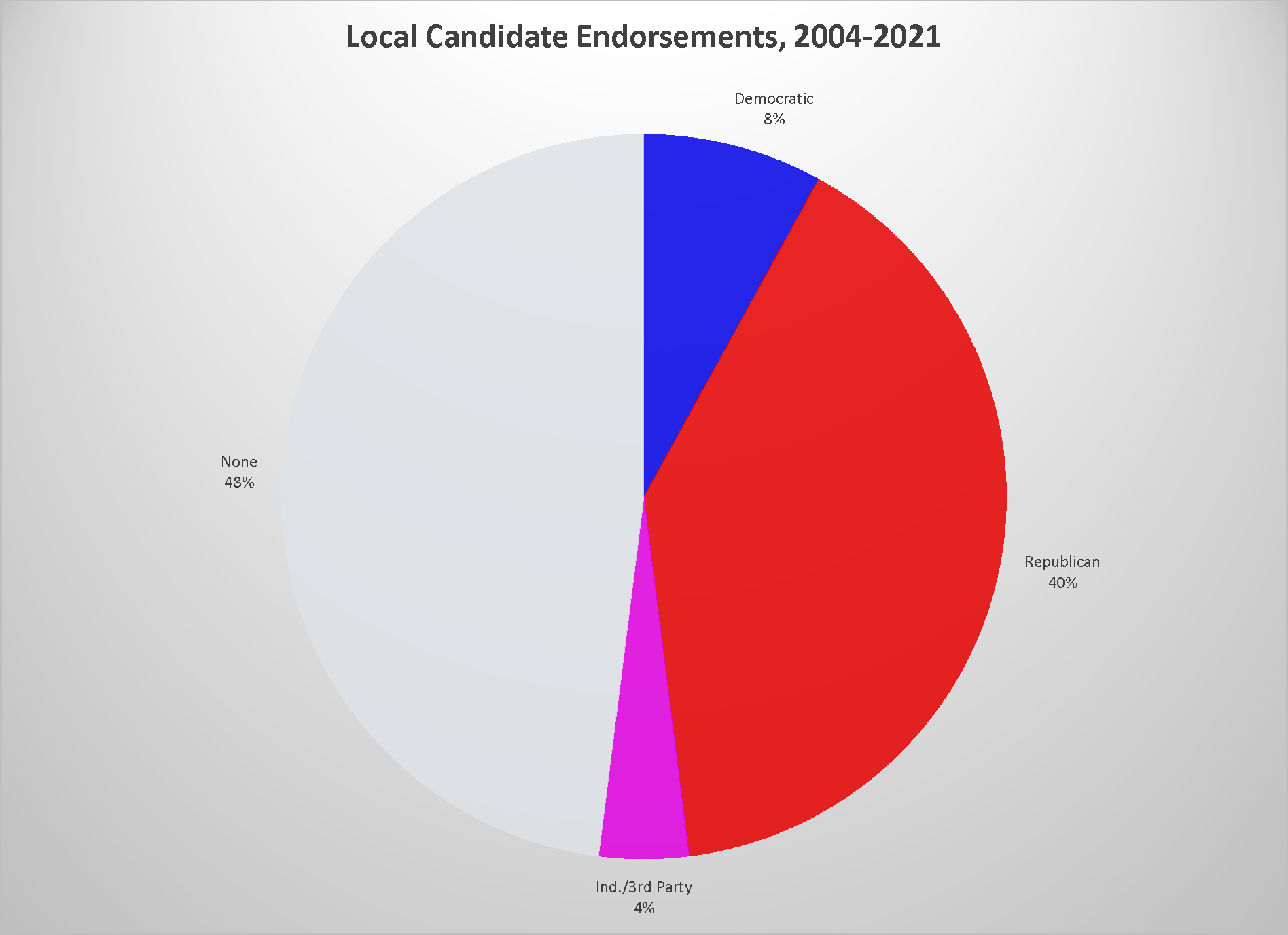
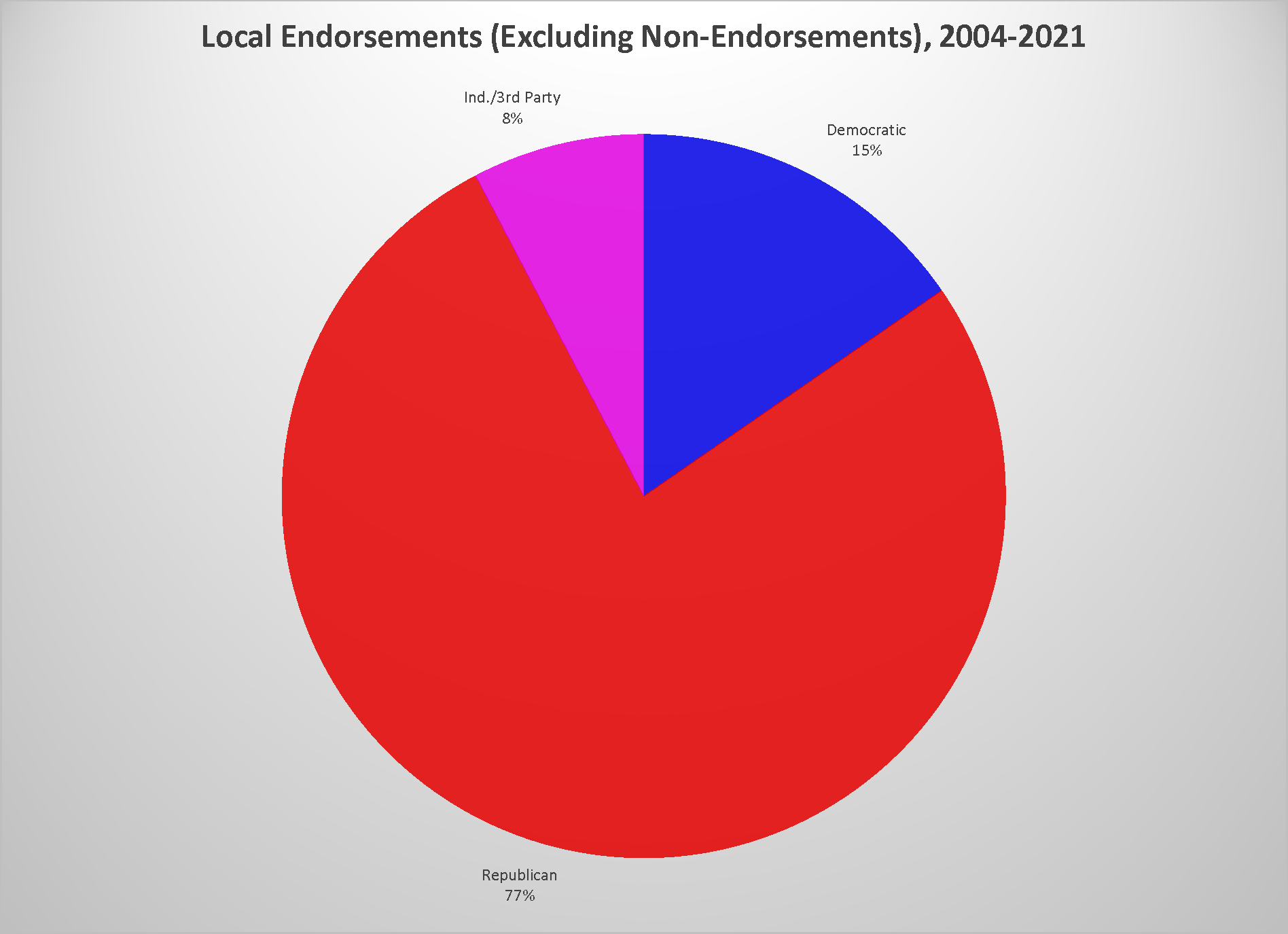
Voter Agreement
It’s interesting to look at how often the voters agreed with the endorsements I made.
Among candidates for political offices, it currently stands at 54% agreement and 46% disagreement (in races where I made an endorsement). So I’m doing slightly better than random chance!
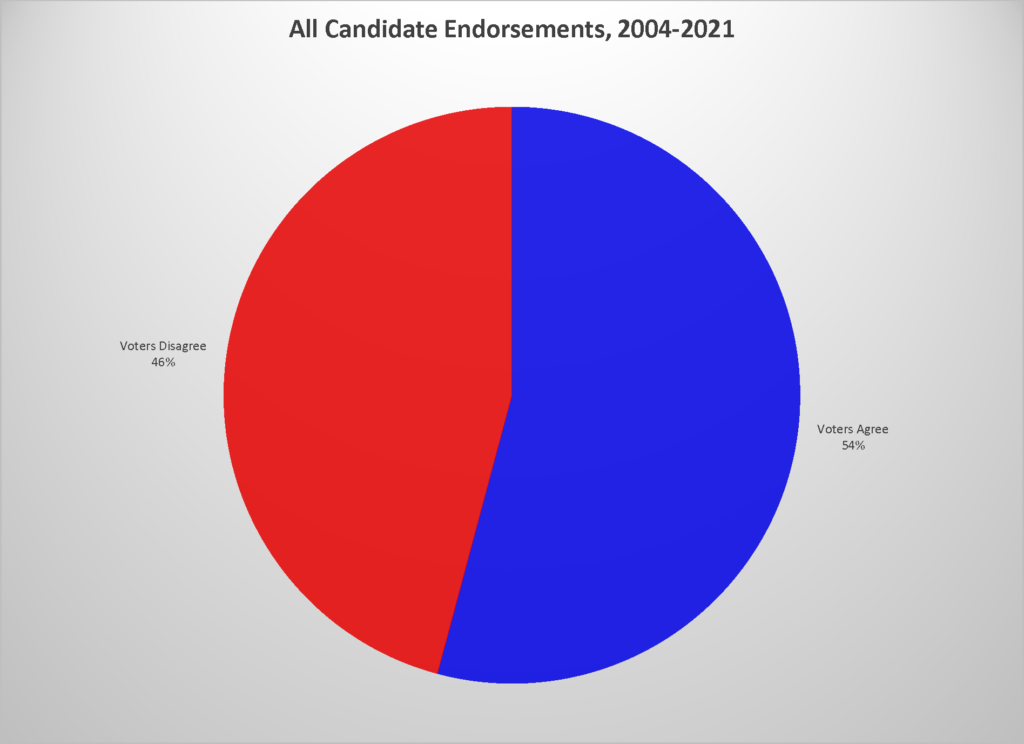
Ballot Issues
Between 2004 and 2021 I made endorsements in 61 yes/no ballot issues, an average of 3.59 issues per year. At a glance, it looks pretty even: I endorsed a “yes” vote 52% of the time and a “no” vote 48% of the time.
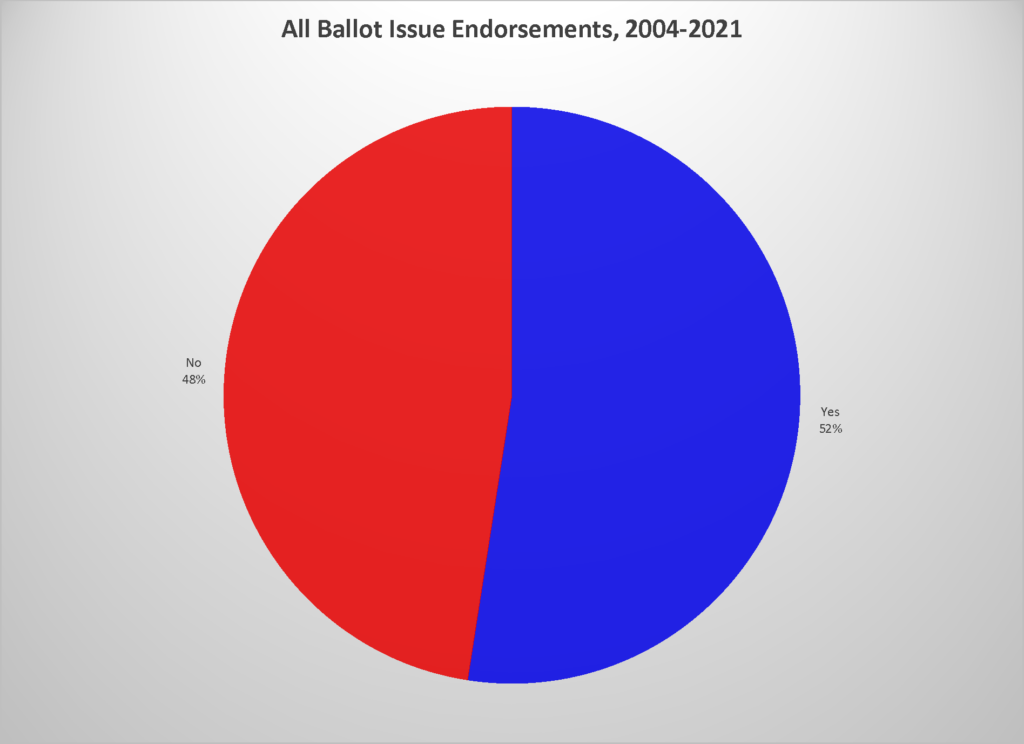
But there is a marked difference between the two kinds of ballot issues that appear on Virginia ballots.
When it comes to proposed amendments to the Constitution of Virginia, I have been generally supportive: 88% for “yes” and 12% for “no.” This is because the amendments proposed over the time I have been making endorsements have mostly been innocuous.
But when it comes to local bond issues, it looks a lot different: only 39% for “yes” and 61% for “no.” This is because bonds are debt, and debt is bad, and debt should only be used to fund projects when there is no way to fund them out of the general fund.
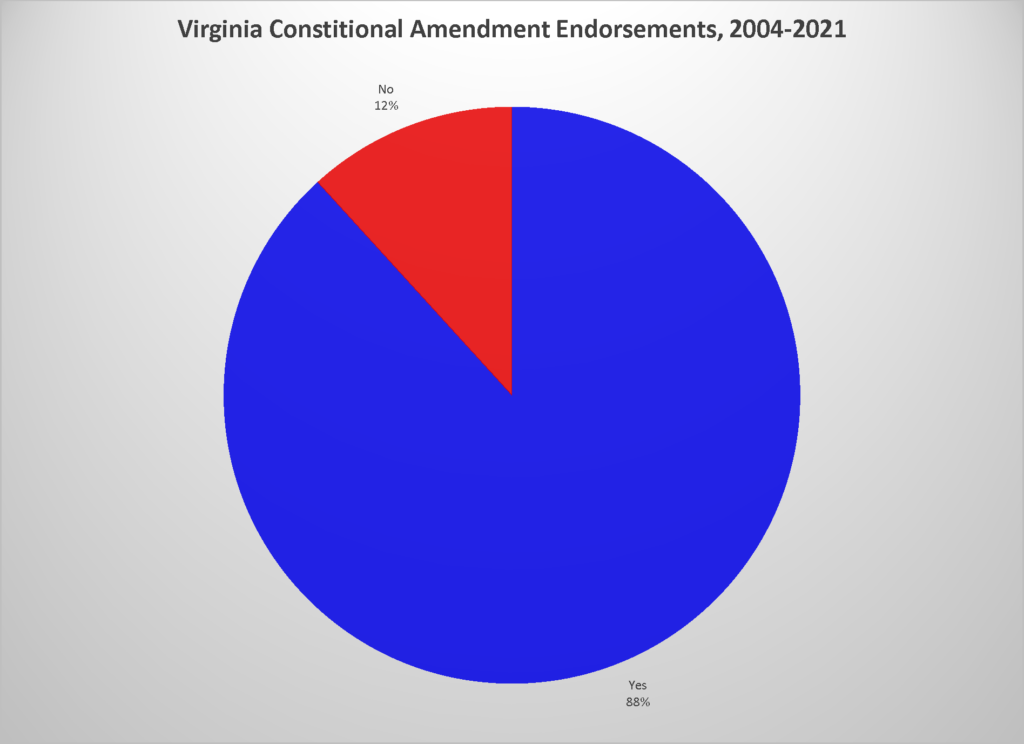
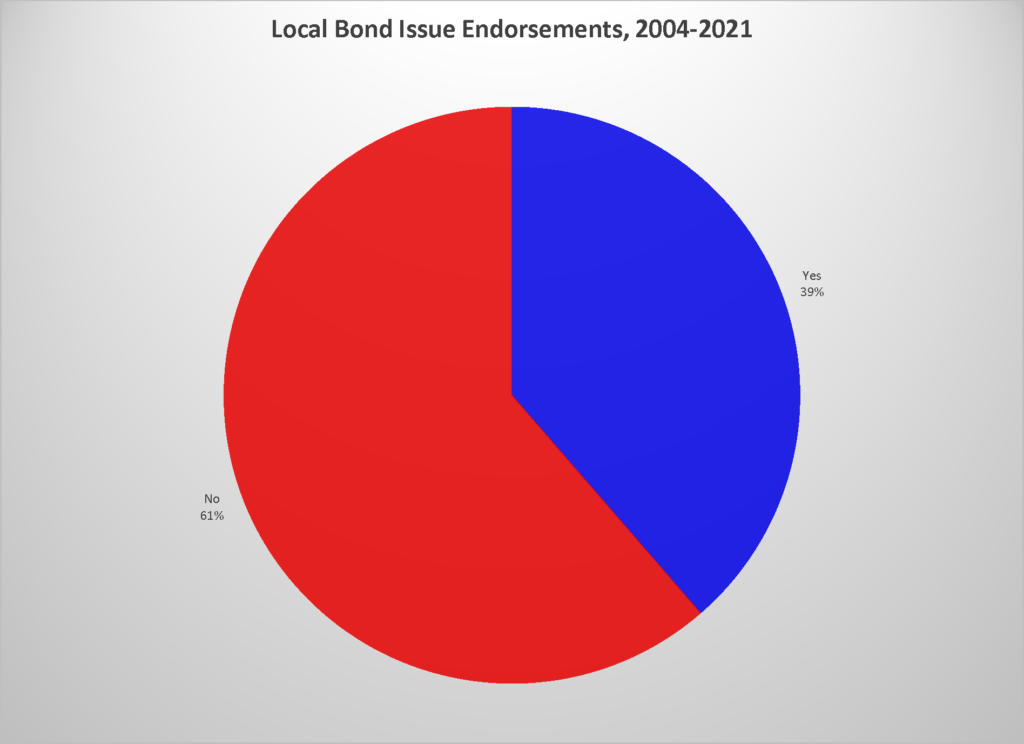
Voter Agreement
On ballot issues, I’m basically evenly split with the general public. Voters agreed with my endorsement 51% of the time, and disagreed 49% of the time. And yet here, too, there’s a big difference between the issue types.
Voters agreed with me about 88% of the time on state constitutional amendments, but only about 39% of the time on local bond referendums.
I still attribute this, more than anything else, to the voters’ lack of understanding about what bonds are and when they should be used. Many simply vote ‘yes’ because they support schools, parks, roads, or whatever the description on the ballot says. Most do not take the time to evaluate whether new public debt is necessary in each particular case.
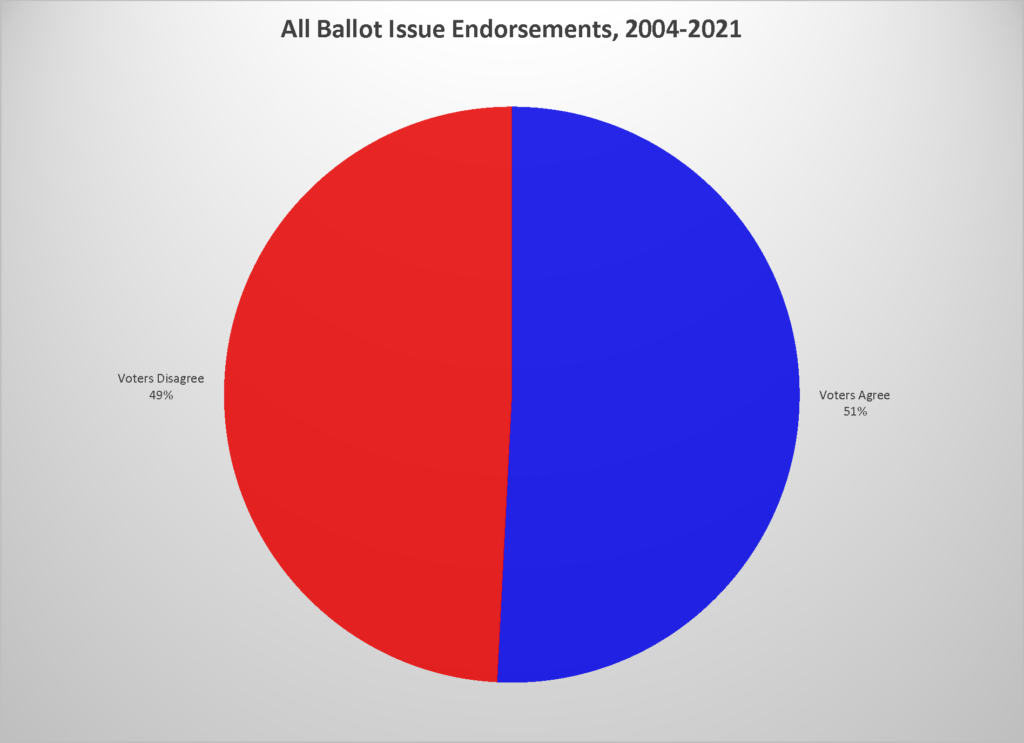
Conclusion
Not much has changed since I ran through this exercise last time.
I’m still leaning pretty hard to the Republican side of the spectrum. I wish that weren’t the case. But it is very difficult for me to vote for any candidate who denies the right to life, denies the right to keep and bear arms, denies the freedom of speech, and denies the freedom of religion . . . and these denials have, inexplicably, become central to the modern Democratic Party platform.
So the Republicans often end up being the “lesser of two evils.” The most attractive third-party—the Libertarians—tend to be right about many issues, and yet also tend to deny the right to life. It’s hard to take anybody seriously who doesn’t support the right that is the foundation upon which all others rest. If we don’t first acknowledge the right of every human person to live, then nothing else really matters, does it?
But I am no hard-core partisan. Give me better alternatives and I’ll vote for them, no matter what party, no matter what background. Until that happens, I suspect that the above trends will continue. I’ll still tend to hold my nose and vote for mediocre Republicans because they are better than the increasingly anti-humanist Democrats.
But this article is, in fact, an invitation to any person and any party who will listen. You can earn my vote. I have no qualms about voting for a Democrat . . . if that Democrat is a supporter of all of the fundamental human rights, including the right to life, the right to keep and bear arms, and the freedom of religion. And I will not support a Republican who does not support these rights unless the alternatives are worse.
I remain independent.
Put any label after your name and I don’t care, as long as you are right (or at least more right than your opponents) on the fundamental issues before us. Call yourself a Republican or Democrat, Green or Libertarian, Constitutionalist or Socialist, Progressive or Nationalist, Communist or Know-Nothing, Whig or Federalist. Labels do not matter. But if you give me reason to believe that you support the fundamental human rights, support sound budgets and monetary policy, and believe in federalism, I am likely to vote for you.
Good luck!

